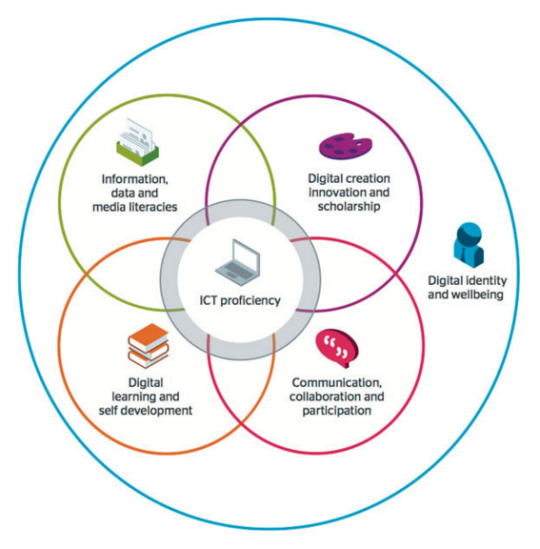Last week I attended a joint QAA / Jisc event at the University of Southampton about embedding digital literacies in higher education. It was a valuable event that offered plenty of opportunities to hear from learning and teaching experts, and network with colleagues from other UK HEIs.
The QAA hosted the event and kicked it off with a short introduction to parts of the The Quality Code that relate to digital literacies. They asked some thought provoking questions about how organisations support and lead the way in the development of student and staff digital literacies. How are they assessed? Are teaching staff equipped enough in their knowledge and skills to be confident in their use of technology in their teaching.
These are all questions that the Educational Technology team can help to answer. One of our main responsibilities and interests lay in researching good practice in these areas, and coming up with ways that Falmouth can tackle answering these questions. This event was part of that research; I heard case studies from Brighton, Southampton, Oxford Brookes and Trinity Laban about how they are promoting digital literacies at their institutions.
Mark touched on the Jisc digital capabilities project in his Lens on… series post about digital literacies the other week, and I also heard from Helen Beetham at this event about Jisc’s work. Helen spoke about how, first of all, they are trying to move away from the term ‘literacies’ towards ‘capabilities’ and I like that they’re doing this. It is more representative of what is being achieved through building digital skills. The project is running 2014-2016.
So far they have built a framework consisting of 6 elements that describe the skills needed by staff in a range of academic, administrative and professional roles. It is intended to provide a structure to help users understand what they’re aiming for, and the types of tools that can used or developed to support them.

Digital Capability Framework, Jisc
The case studies I then heard about helped to put the framework into context for me throughout the day.
First of all, we heard from Fiona Handley about the University of Brighton’s impressive Digital Literacies Framework which was built as a response to an institutional goal relating to ‘digital transformation’ in 2012 and has continually evolved since. It has been developed for staff and students at Brighton to guide them through a series of items on which they can reflect; including research, communication and collaboration, administration and learning and teaching specific skills. It is included as part of their PGCHE programme.
We then heard from Fiona Harvey from University of Southampton about the iChamps, or DigiChamps, project at Southampton. A network of multidisciplinary students from Undergraduates to Postgraduates who work with all staff, including academics at the University on initiatives relating to developing digital skills. They are guided and supported by a network of Student Champions who oversee how they work, and ensure academic rigour. Students can put themselves forward to become an iChamp, and staff can choose who they work with. iChamps build up a portfolio of evidence through their work with staff and can achieve digital badges to evidence their achievement through the iChamp scheme.
Next up was George Roberts from Oxford Brookes who gave an enlightening overview of their approach to developing digital literacies. They have combined Digital and Information Literacy skills into the Brookes Taxonomy of Digital and Information Literacies. Within this taxonomy there are three digital and three information literacy skills; some of which are centred around being confident in navigating your way around technology, and your engagement in activities involving digital tools for reflection, recording learning and collaborating. And some of which are centred around building confidence in your ability to choose appropriate actions and strategies to obtain information, assessing if it is actually what you’re looking for, and applying and/or communicating it effectively.
And last but not least Louise Jackson from Trinity Laban Conservatoire of Music and Dance gave us an overview of how the Arts focused institution has taken an effective approach to embedding digital literacies outside of the creative space, but maintained a more traditional approach within the studio. Dance students have been using blogs to reflect on their work and plan using post-its and transferring that to digital format. It sounds like it would be duplicating, but they find it effective. Louise described their approach as building trust through communities of practice with the students:
“Embodied experience of writing is different to digital upload: this matters to dance students”
Staff have been encouraged to develop their skills through the attainment of HEA fellowship and skills development is aligned to the UKPSF.
There was a discussion session at the end of the day and we talked about the introduction of the Teaching Excellence Framework (TEF). I don’t think anyone would disagree with me when I say that the introduction of the TEF will impact the expectations that students and anyone else that should have an opinion will be arriving with. So it’s time to start thinking about how that impacts on our own skills and how they can be developed and/or re-purposed to create excellent learning experiences for the students… amongst other things.
Overall the day was a valuable learning experience, and it was great to see some old and new faces. I have come away from it with some ideas for Falmouth, so if you’re interested in getting involved in your own, your team’s or department’s development of digital skill/literacies/capabilities then do get in touch.